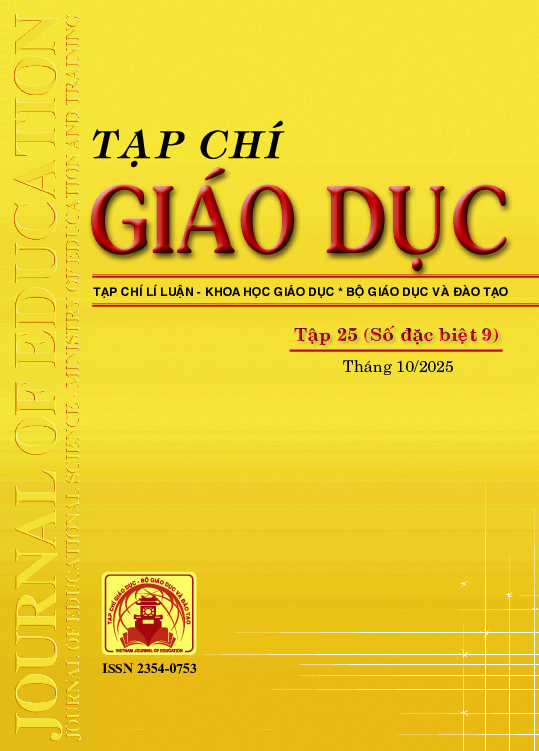Khám phá trải nghiệm học tập của sinh viên trong bối cảnh tự chủ đại học: Nghiên cứu trường hợp tại một trường đại học công lập ở thành phố Hồ Chí Minh
Tóm tắt
In the context of Vietnam's higher education gradually transitioning to an autonomous model, the quality of teaching has emerged as a top priority. Nevertheless, current surveys are predominantly administrative, paying limited attention to deeply exploring students' learning experiences through the lens of lecturer evaluations. This study investigates the learning experiences of students at a public university in Ho Chi Minh City, employing a combined approach of quantitative and qualitative methods. Utilizing a questionnaire with 11 indicators and open-ended interviews with 309 students, analyzed through thematic coding and Exploratory Factor Analysis (EFA) on SPSS, the research has illuminated four core aspects: teaching competence, teaching style, evaluation methods, and the supportive learning environment, while proposing a practical theoretical framework. This framework highlights the critical role of the supportive environment, aligning with Vietnam's autonomous context where infrastructure and administrative policies play significant roles. The study recommends that universities invest in improving infrastructure, optimize administrative management to enhance learning experiences, and expand research to other contexts to validate the framework's broader applicability.
Tài liệu tham khảo
Astin, A. W. (1984). Student involvement: A developmental theory for higher education. Journal of College Student Personnel, 25(4), 297-308.
Biggs, J., & Tang, C. (2011). Teaching for quality learning at university (4th ed.). Open University Press.
Bộ GD-ĐT (2025). Thông tư số 04/2025/TT-BGDĐT ngày 17/02/2025 quy định Tiêu chuẩn, chỉ tiêu đánh giá chất lượng giáo dục đại học.
Braun, V., & Clarke, V. (2006). Using thematic analysis in psychology. Qualitative Research in Psychology, 3(2), 77-101. https://doi.org/10.1191/1478088706qp063oa
Carless, D. (2006). Differing perceptions in the feedback process. Studies in Higher Education, 31(2), 219-233. https://doi.org/10.1080/03075070600572132
Chen, Y., & Hoshower, L. B. (2003). Student evaluation of teaching effectiveness: An assessment of student perception and motivation. Assessment & Evaluation in Higher Education, 28(1), 71-88. https://doi.org/10.1080/02602930301683
Chính phủ (2019). Nghị định số 99/2019/NĐ-CP ngày 30/12/2019 ban hành Quy định chi tiết và hướng dẫn thi hành một số điều của Luật sửa đổi, bổ sung một số điều của Luật Giáo dục đại học.
Elliott, K. M., & Shin, D. (2002). Student Satisfaction: An alternative approach to assessing this important concept. Journal of Higher Education Policy and Management, 24(2), 197-209. https://doi.org/10.1080/1360080022000013518
Fredricks, J. A., Blumenfeld, P. C., & Paris, A. H. (2004). School engagement: Potential of the concept, state of the evidence. Review of Educational Research, 74(1), 59-109. https://doi.org/10.3102/00346543074001059
Gibbs, G., & Simpson, C. (2004). Conditions under which assessment supports students’ learning. Learning and Teaching in Higher Education, 1(1), 3-31.
Harvey, L., & Green, D. (1993). Defining quality. Assessment & Evaluation in Higher Education, 18(1), 9-34. https://doi.org/10.1080/0260293930180102
Harzer, C., & Ruch, W. (2015). The role of character strengths for academic outcomes: A longitudinal analysis. Learning and Individual Differences, 37, 11-22. https://doi.org/10.1016/j.lindif.2014.11.023
Kahu, E. R. (2011). Framing student engagement in higher education. Studies in Higher Education, 38(5), 758-773. https://doi.org/10.1080/03075079.2011.598505
Kuh, G. D. (2009). The national survey of student engagement: Conceptual and empirical foundations. New Directions for Institutional Research, 2009(141), 5-20. https://doi.org/10.1002/ir.283
Lim, D. H., & Morris, M. L. (2009). Learner and instructional factors influencing learner satisfaction in asynchronous online courses. Distance Education, 30(1), 109-126. https://doi.org/10.1080/01587910902845949
Marsh, H. W. (2007). Students’ evaluations of university teaching: Dimensionality, reliability, validity, potential biases, and usefulness. Trong R. P. Perry & J. C. Smart, The Scholarship of Teaching and Learning in Higher Education: An Evidence-Based Perspective (pp. 319-383). Springer Netherlands. https://doi.org/10.1007/1-4020-5742-3_7
Nguyen Lan Anh (2023). Bypassing opportunities for quality improvement: insights from Vietnamese administrators’ approaches to student evaluation of teaching. Quality Assurance in Education. https://doi.org/10.1108/qae-04-2023-0067
Nguyen Trung Dang (2024). Examining the Impact of University Teaching Quality on Learning Engagement: A Cross-sectional Study in Vietnam. Vietnam Journal of Education, 8(2), 102-111. https://doi.org/10.52296/vje.2024.378
Podsakoff, P. M., MacKenzie, S. B., Lee, J.-Y., & Podsakoff, N. P. (2003). Common method biases in behavioral research: A critical review of the literature and recommended remedies. Journal of Applied Psychology, 88(5), 879-903. https://doi.org/10.1037/0021-9010.88.5.879
Pham, N. T. T., Nguyen, Q. N., Nguyen, N. T., Chu, H. M., Ngo, T. V., Le, P.-S., & Chau, T. T. V. (2022). Quality Assurance of Higher Education in Vietnam: The Impact of Autonomy Policy. Vietnam Journal of Education, 6(3), 277-288. https://doi.org/10.52296/vje.2022.245
Quốc hội (2018). Luật Giáo dục đại học. Luật số 34/2018/QH14, ban hành ngày 19/11/2018.
Race, P. (2007). The lecturer’s toolkit: A practical guide to assessment, learning and teaching (3rd ed.). Routledge.
Spooren, P., Brockx, B., & Mortelmans, D. (2013). On the validity of student evaluation of teaching: The state of the art. Assessment & Evaluation in Higher Education, 38(6), 685-699. https://doi.org/10.3102/0034654313496870
Tran Le Huu Nghia, Ly Thi Tran (2020). Students’ Experiences of Teaching and Learning Reforms in Vietnamese Higher Education. https://doi.org/10.4324/9780429400261
Verhelst, D., Vanhoof, J., & Van Petegem, P. (2021). Development and validation of the education for sustainable development school organisation questionnaire. Environmental Education Research, 28(2), 241-259. https://doi.org/10.1080/13504622.2021.2007219
Weimer, M. (2013). Learner-centered teaching: Five key changes to practice (2nd ed.). Jossey-Bass.
Đã Xuất bản
Cách trích dẫn
Số
Chuyên mục
Giấy phép

Tác phẩm này được cấp phép theo Ghi nhận tác giả của Creative Commons Giấy phép quốc tế 4.0 .












